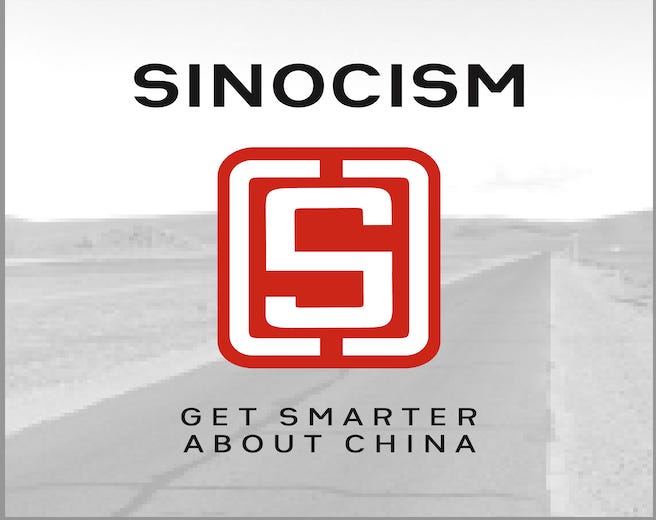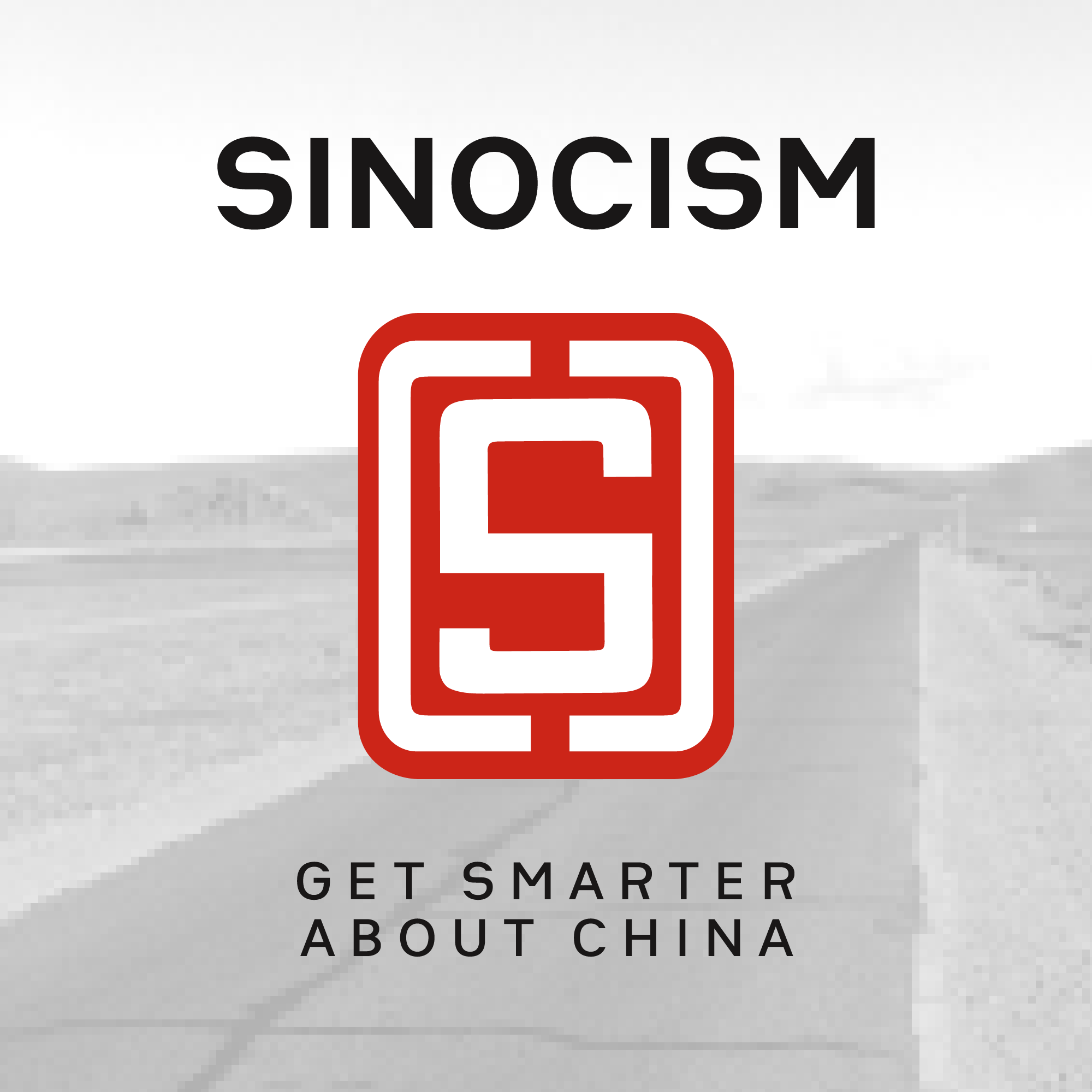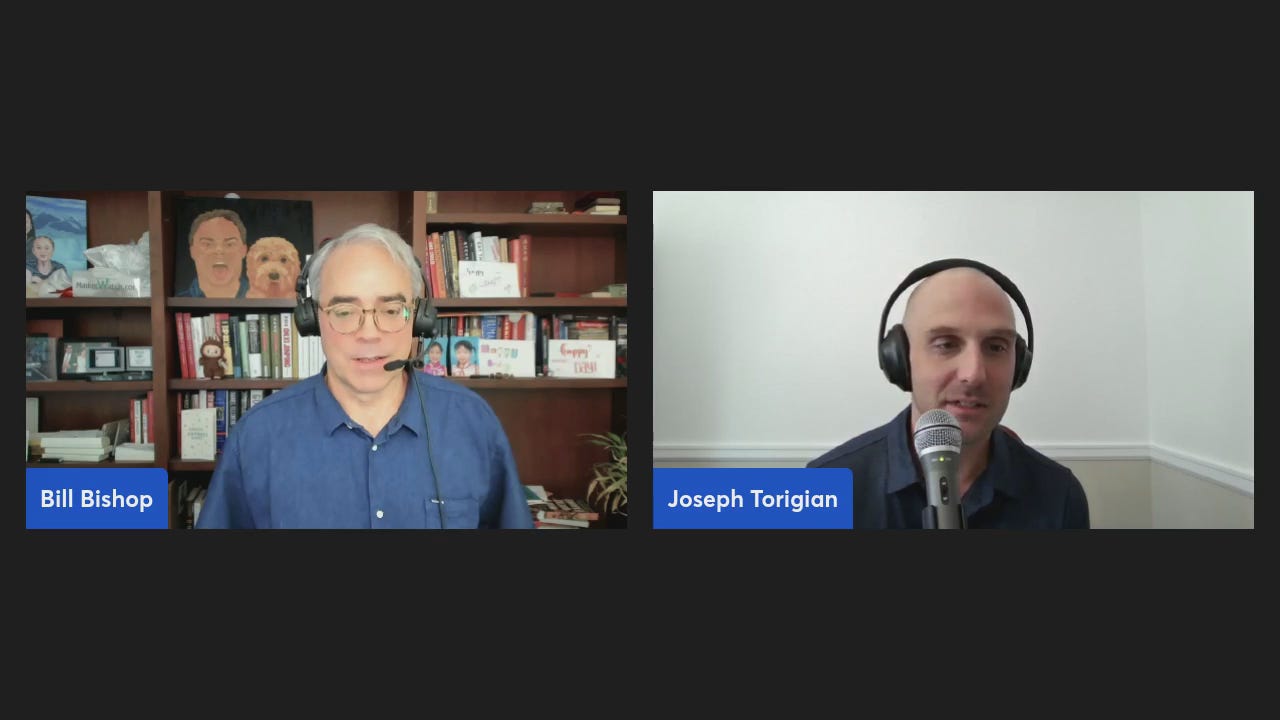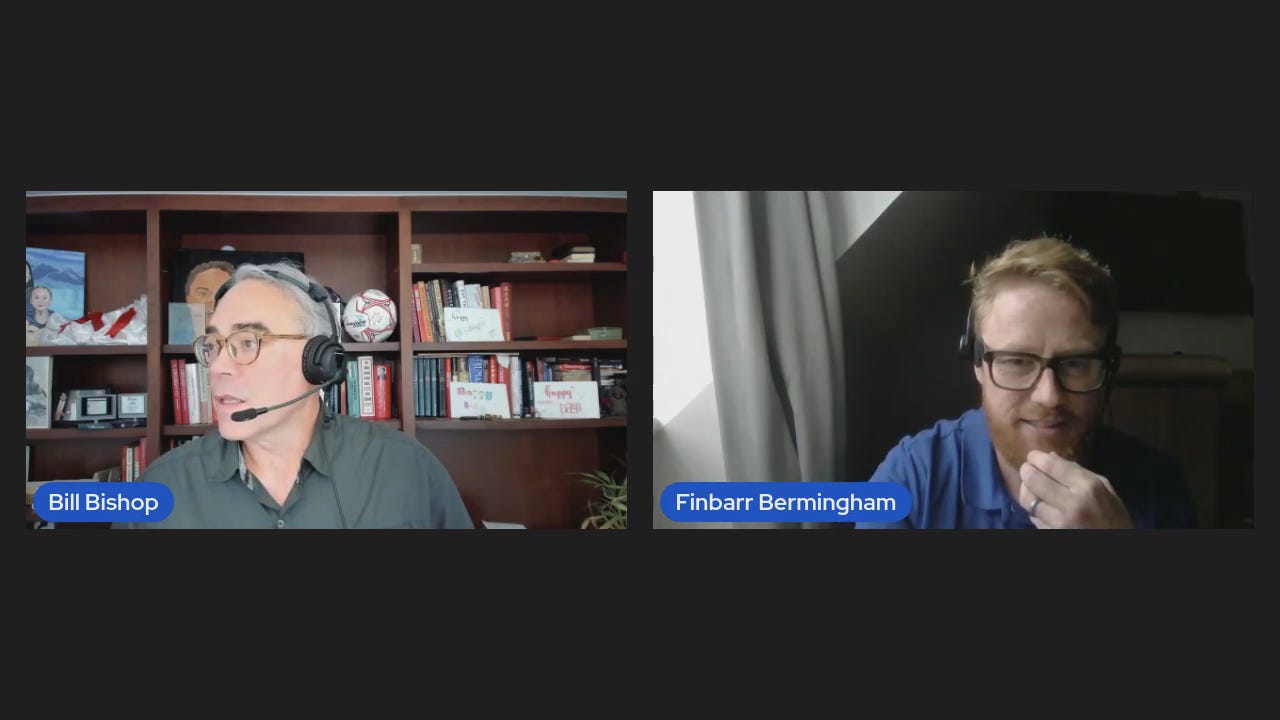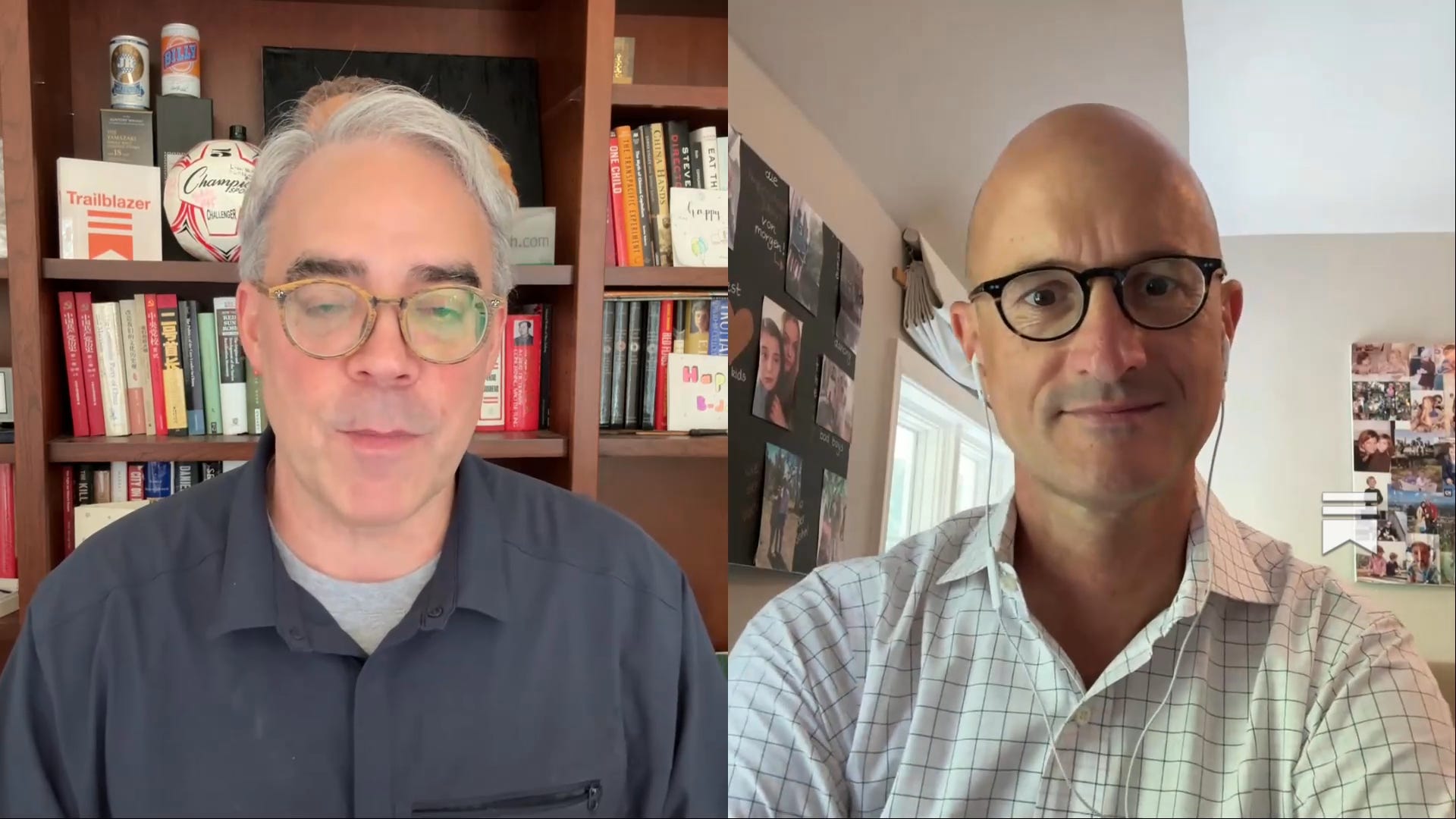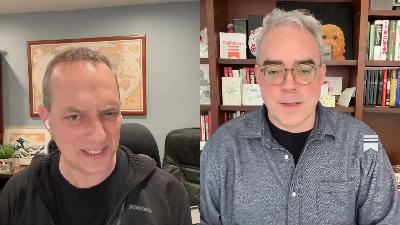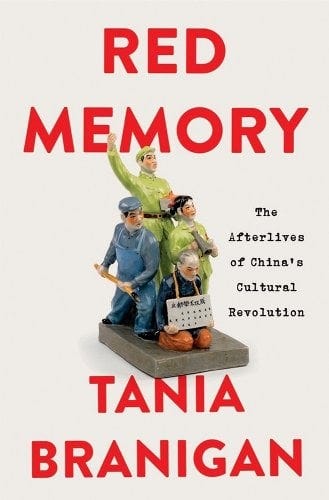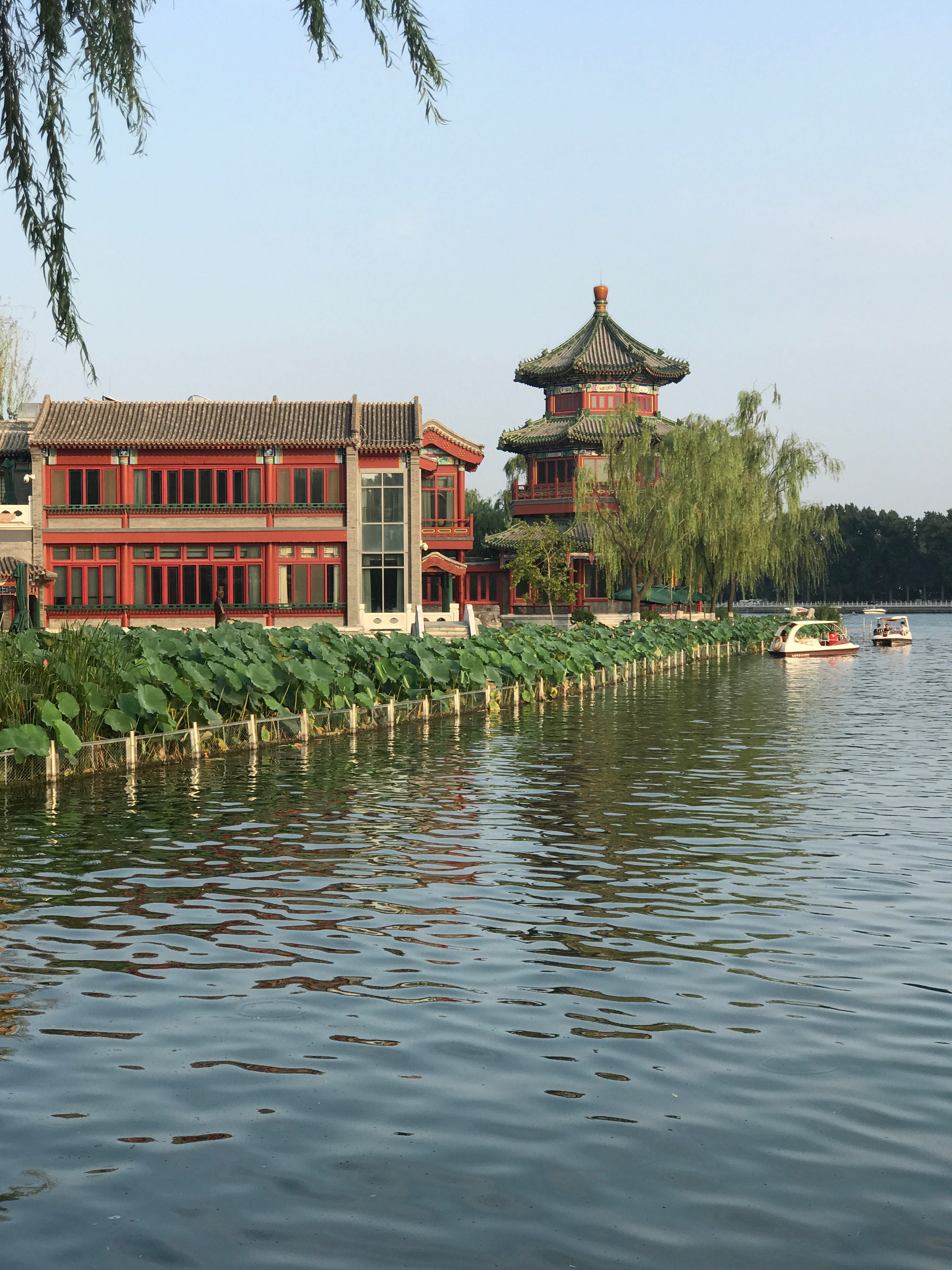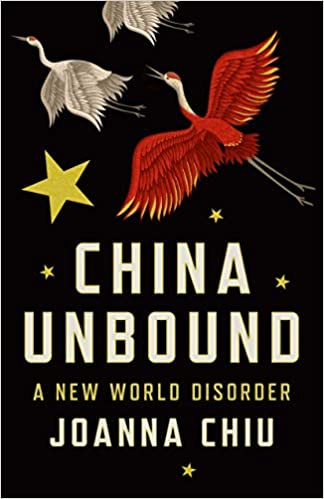Sinocism Podcast #1: Chris Johnson on US-China relations, Xi Jinping and the 6th Plenum
Description
Episode Notes:
Today, we're going to talk about US-China relations, the upcoming Sixth Plenum , Xi Jinping, and what we might expect for the next year heading into the 2022 20th Party Congress among other topics. I'm really pleased that our first guest for the Sinocism Podcast is Chris Johnson, CEO of Consultancy China strategies Group, senior fellow at the Center for Strategic International Studies and former senior China analyst at the Central Intelligence Agency.
4:45 on US-China relations - I think their assessment is that it's working. In other words, by maintaining that sort of very strict line, they've gotten Madam Meng of Huawei fame home. They've gotten the trade discussions going again. They've got the US saying, "Well, we might lengthen the timeline for you to implement phase one." In other words, it's working from their perspective.
13:30 on the 6th Plenum - The first I think is that, it would represent, I think the net evolution in what I call Xi Jinping's further development of his leadership supremacy. And, I use those terms very deliberately because often times, the shorthand we see in describing this as references to Xi's consolidation of power. Well, in my mind that took place very early on in his tenure.
30:00 on the economy and heading towards the 2022 20th Party Congress - Equally important in my mind is how little the leadership and the economic technocrats seem to be rattled by that fact. In other words, we're not seeing the stimulus wave. We're not seeing monetary policy adjustments in a significant way. There's a lot of study as she goes. And, that could change. We've got the central economic work conference, obviously in December, which will give us a sense of how they're thinking about next year. But like so many other things, I think we as watchers and the investment community and others, we're slow to sometimes break with old narratives. One of which is you must welcome a party Congress with very high growth. And every signal coming out of the leadership is that, they're not playing that game anymore. I think that's fairly strong.
37:00 On US-China relations - I think if you're a senior US policymaker, your working assumption has to be that China's more likely to get it right than to get it wrong, even if they only get it 30% right or 40%, something like that…Chris Johnson:Xi is here and will be here for the foreseeable future. And therefore there won't be any change in the policies largely that he's articulated.
Links: More about Chris Johnson and his China Strategies Group here.
Transcript:
Bill Bishop:Today, we're going to talk about US-China relations, the upcoming Sixth Plenum , Xi Jinping, and what we might expect for the next year heading into the 2022 20th Party Congress among other topics. I'm really pleased that our first guest for the Sinocism Podcast is Chris Johnson, CEO of Consultancy, China strategies Group, senior fellow at the center for strategic international studies and former senior China analyst at the Central Intelligence Agency. Welcome, Chris.Chris Johnson:Great to be here, Bill.Bill Bishop:Chris, welcome. I think today, what I really like to start out with is just an overview where you see the state of US-China relations and how the new administration, I mean it's 10 months now or thereabouts, but how the new administration is doing and how the Xi Jinping administration is reacting.Chris Johnson:Great. Yeah. Well, it's obviously a unique time in US-China relations. I guess, if I had to characterize it in a phrase, I would say, things are a bit of a mess. I think, if we start, it's useful to start at a sort of high order level and then work our way down in terms of thinking about the relationship. So I think at the highest order, one of the things that strikes me is that arguably for the first time, since normalization of relations, really, we're in this strange position where I think both countries, both leaders and perhaps increasingly, even both peoples, aren't overly keen to engage with one another.Chris Johnson:I think, we've had times in the past during the last several decades where maybe one side or the other was feeling that way, but not both. And the sense that I get in terms of the leader to leader view is, both Xi Jinping and President Biden are kind of looking at each other and saying, "I've got a lot going on at home. I'm very focused on what's happening domestically. I know the other guys out there and I need to pay attention to what he's doing, and right now it's all just his. But, if I can kind of keep him at arm's length, that's okay with me." And I think we're kind of seeing that really on both sides of the fence.Chris Johnson:I think for Xi Jinping, it's a little more intense in that it's hard to see where the good outcomes are for him and trying to lean in toward the relationship and so on, because he's kind of getting what he wants to some degree without doing. So, as to your question about how the administration is doing, I think to be fair, I think we have to say probably about as well as they could given both the domestic constraints, what we might call China's own attitudes and approach toward the relationship right now.Chris Johnson:On the domestic side, by constraints, I mean, the administration from my perspective seems to have an almost neurologically fearful stance of being seen as weak on China. Obviously that comes out of four years of the Trump administration and its approach toward China, stories and tales and recreations of history about how engagement was a failure and how the Obama administration was somehow a main sort of group that failed to understand the reality of the relationship and therefore blew it and a lot of those people are back now. And I think that contributes to this fear. And I think the practical impact of that is that, it's inhibited the administration from doing what I think they need to do, which is to have sort of an objective racking and stacking of what they believe China's global ambitions actually are. And then I think critically beyond that, which of those ambitions the US can live with, because in my assessment, we're going to have to live with at least some of them.
Chris Johnson:And then to be fair to the administration, I think that same needed exercise has been hamstrung by China's own approach, which at least so far, I think we could probably characterize as an unflinching resistance that the US must adjust it's as they like to call it hostile attitude, if progress is going to be made. And, it's my sense that there's really little chance of progress of China's unwilling to move off of that stance. But at the same time, I think their assessment is that it's working. In other words, by maintaining that sort of very strict line, they've gotten Madam Meng of Huawei fame home. They've gotten the trade discussions going again. They've got the US saying, "Well, we might lengthen the timeline for you to implement phase one." In other words, it's working from their perspective.Bill Bishop:And, they presented two lists to Deputy Secretary of State Sherman. And, it certainly seems like there are some of the things on that list that are being worked through. To follow up though, what do you think the administration is doing around Taiwan? Because it seems like over the last couple of weeks, we've had quite a push from Secretary of State Lincoln and others on Taiwan and sort of whether or not it's giving them, returning them to the UN or in a seat or at least giving them more participation in UN bodies. What do you think is driving that and what do you think realistically, the administration believes the outcome's going to be because it certainly seems to be touching the most sensitive point on the Chinese side?Chris Johnson:Yeah. Well, my sense of it is that, regardless of the administration's intention, and I'm not entirely sure what the intention is, the results in Beijing are the same, which is to say that there would be a perception there that the US is unilaterally making a change to what they see as the cornerstone of the bilateral relationship, which is the US adherence to the One China Policy. And, if you're sitting in Beijing's shoes and you're hearing, you're seeing things in the press, you're hearing the president himself say, "Well, we will defend Taiwan." Oops. We didn't mean to say that, but it wasn't, but I didn't misspeak, and these sort of things, and a lot of that has to do with the domestic. Look, the Chinese have never doubted that the US would probably mount some kind of a defense. So, it's not really that issue if the Chinese were to attack. It's the accumulation of what they see as salami slicing erosion of the US commitment to the One China Policy.Chris Johnson:And so in my mind, the only relevant element here is not really the motivations, but what's going on in Xi Jinping's mind. Can he see all of this activity and basically respond by making the appropriate judgment about this erosion in the One China Policy and then quietly taking the appropriate adjustments on war planning and on other things? Or does he feel that with the accumulation of these things, whether it's the debate over whether or not to break with strategic ambiguity, changing the name of Taiwan's defacto embassy in Washington, all these sort things, does he feel that he needs to do something demonstrative now to kind of reset the balance, which was really the motivation behind their military exercises in 1995, '96, for example, when [inaudible 00:07:53 ] came to the United States?Bill Bishop:And of course back then, they had far less capability as they do now. I mean, certainly, I

